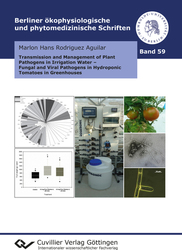| Fachbereiche | |
|---|---|
| Buchreihen (96) |
1381
|
| Nachhaltigkeit |
3
|
| Gesundheitswesen |
1
|
| Geisteswissenschaften |
2369
|
| Naturwissenschaften |
5408
|
| Mathematik | 229 |
| Informatik | 319 |
| Physik | 980 |
| Chemie | 1364 |
| Geowissenschaften | 131 |
| Humanmedizin | 243 |
| Zahn-, Mund- und Kieferheilkunde | 10 |
| Veterinärmedizin | 108 |
| Pharmazie | 147 |
| Biologie | 835 |
| Biochemie, Molekularbiologie, Gentechnologie | 121 |
| Biophysik | 25 |
| Ernährungs- und Haushaltswissenschaften | 45 |
| Land- und Agrarwissenschaften | 1005 |
| Forstwissenschaften | 201 |
| Gartenbauwissenschaft | 20 |
| Umweltforschung, Ökologie und Landespflege | 148 |
| Ingenieurwissenschaften |
1795
|
| Allgemein |
98
|
|
Leitlinien Unfallchirurgie
5. Auflage bestellen |
|
Erweiterte Suche
Transmission and Management of Plant Pathogens in Irrigation Water (Band 59)
Fungal and Viral Pathogens in Hydroponic Tomatoes in Greenhouses
Marlon Hans Rodriguez (Autor)Vorschau
Leseprobe, PDF (320 KB)
Inhaltsverzeichnis, PDF (97 KB)
Recirculating fertigation solutions in hydroponic cultivation systems reduce production costs. They are environmentally friendly, especially because they minimize the consumption of fresh water. However, there is a high risk of epidemics due to accumulation and dispersal of plant pathogens via irrigation water. If the drain is not treated before reuse, even a few pathogens can jeopardize production and lead to high economic losses. This PhD-thesis analyzes and evaluates the eff ect of an electrolytically derived disinfectant, potassium hypochlorite (KClO), on various plant pathogens in tomato crops. In vitro and in vivo studies were conducted to determine i) the potential of the disinfectant to inactivate pathogens such as Tobacco mosaic virus and Pepino mosaic virus, Fusarium oxysporum f.sp. lycopersici and Rhizoctonia solani and ii) its suitability to prevent the spread of pathogens via fertigation solution in hydroponic tomato production.
| ISBN-13 (Printausgabe) | 9783689520755 |
| ISBN-13 (E-Book) | 9783689520502 |
| Buchendformat | A5 |
| Sprache | Englisch |
| Seitenanzahl | 88 |
| Umschlagkaschierung | matt |
| Auflage | 1. |
| Buchreihe | Berliner ökophysiologische und phytomedizinische Schriften |
| Band | 59 |
| Erscheinungsort | Göttingen |
| Erscheinungsdatum | 09.07.2024 |
| Allgemeine Einordnung | Dissertation |
| Fachbereiche |
Land- und Agrarwissenschaften
Pflanzenproduktion Gartenbauwissenschaft |
| Schlagwörter | water, nutrient, plant, recirculating, chlorine, disinfection, virus, pathogens, tomato, plants, recirculating, viruses, agriculture, phytophthora, hydroponic, biology, oxysporum, hydroponics, fusarium, greenhouse, greenhouses, phythium, agricultural, propagules, actahortic, technology, stanghellini, tomatoes, rhizoctonia, oxidation, hypochlorite, fungi, dispersal, diseases, potato, pepino, membrane, chlorination, Wasser, Nährstoff, Pflanze, Kreislaufführung, Chlor, Desinfektion, irrigation, Bewässerung, Krankheitserreger, Tomate, Pflanzen, Kreislaufwirtschaft, Viren, Landwirtschaft, Phytophthora, Hydroponik, Biologie, Oxysporum, Hydroponik, Fusarium, Gewächshaus, Gewächshäuser, Phythium, Landwirtschaft, Vermehrung, Aktahortik, Technologie, Stanghellini, Tomaten, Rhizoctonia, Oxidation, Hypochlorit, Pilze, Ausbreitung, Krankheiten, Kartoffel, Pepino, Membran, Chlorierung, |








